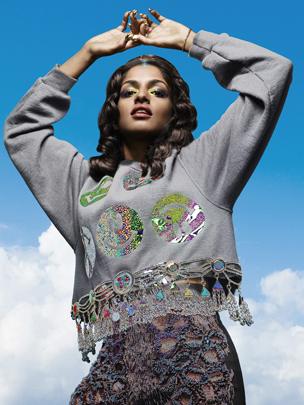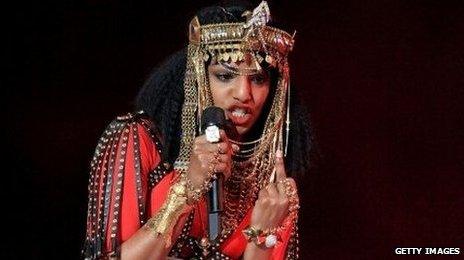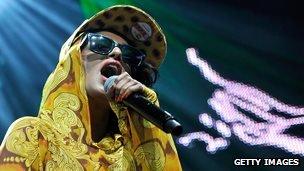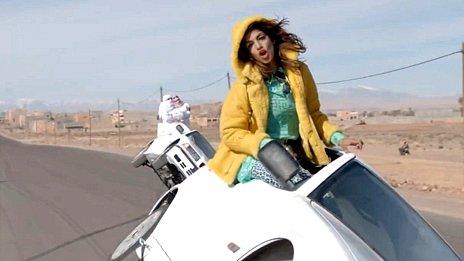MIA: Pop's provocateur comes of age
- Published

Raised in Sri Lanka and Hounslow, London, MIA makes riotous, globetrotting agitprop pop
Musical provocateur, anti-establishment propagandist, enemy of the SuperBowl: MIA is many things. But, surprisingly, her latest album was inspired by a chance encounter with a deity on Google.
For a long time, MIA thought her third album would be her last.
Released three years ago, it was called MAYA, after the name she took when she moved from Sri Lanka to England as a refugee, a week before her 11th birthday.
Maya was the person she became to fit into western society. The album reflected the moment that identity crumbled.
"The civil war in Sri Lanka came to an end," says the 38-year-old. "I'd become successful, so that [ambition] came to an end. I'd had a baby, so my freewheeling youth came to an end."
Written in "a state of flux," MAYA was abrasive and disorientating. It sold a fifth of its predecessor - which contained the global smash hit Paper Planes - and MIA decided to quit music.
She became preoccupied with death and reincarnation, fixating on the Tamil people who lost their lives in Sri Lanka's 25-year war, where her father had been a key agitator (and, later, a mediator).
"I started thinking 'what happens when they die?'" she says.
"And I thought, 'well, they must reincarnate, because they're Hindus, which is great news for them. But the battle is whether they're going to come back angry or pissed off, because of their lives being cut short."
"It was a random thought," she adds. "None of my friends were interested in having this conversation. It's just stuff I would think about when I was in the bath."

The star had a global hit with Paper Planes, the Clash-sampling single which found its way onto the Slumdog Millionaire soundtrack
Looking back, MIA realises she was trying to make sense of the upheaval in her life. "I had to change and move and embrace new things," she says.
And, eventually, she managed it: Not in the bath - but on Google.
She was in India creating new artwork, when she typed in "green" and the word Matangi popped up. The singer's first name is Mathangi (with an extra "h") so, naturally, she clicked the link.
What she discovered was a 5,000-year-old Hindu goddess, with four arms and green skin. Often pictured on a throne, playing sitar, Mantangi governs speech, music, knowledge and the arts.
The more MIA searched, the more affinity she felt with her ancient namesake.
"Her mantra was MIA backwards, her mudra [ritual gesture] was the middle finger, and she was versed in 64 arts called the Kala, which is my mum's name," she says. "It was really exciting."
The discovery amounted to a spiritual awakening, and it gave the singer a renewed sense of her place in the world.
"It was something I needed to find," she says. "Some sort of confirmation."
'Spa music'
MIA stresses she hasn't "found religion" - in the traditional sense, at least.
"I don't like the idea of spirituality done the way it's done," she says.
"The only way I could understand it was through creativity, not by going to an Ashram, or finding a guru, or joining a temple. I made work out of it."
The result is her new album - called, inevitably, Matangi. Unlike her last record, she says, it is "based in acceptance".
Nonetheless, MIA was nervous about bringing it to her record label.
"People expected spa music," she laughs. "But it doesn't have a tranquil flute massage sound."
No. Musically, Matangi is business as usual: A chaotic, digitally-degraded thunderstorm of hip-hop and bhangra; punk and pop; spitfire raps and thorny wordplay.
But it adds a few new sounds to MIA's sonic armoury, most notably Hinduism's "om" chant.
In making an album about a goddess, she says, the auditory possibilities were infinite.
"You could record the rain for half an hour and sneeze on it, and you could build meaning into it," she says.
She didn't quite go that far - but one song, Attention, was recorded standing in the rain on the Caribbean island of Bequia.
"If you isolate the vocals, it's got everything in it - the crickets and the animals and the birds," she says.
Sued by the SuperBowl
MIA had fled to Bequia after her appearance at the 2012 SuperBowl, where she joined Madonna on stage to perform Give Me All Your Luvin'.
Instructed to censor a lyric during her 20-second rap, the singer instead raised her middle finger to the camera.
America went apoplectic.
"I literally had to make out of there like a diamond robber," she says of the aftermath. "There was so much press. I was like, 'I can't believe this, it's insane.'"

The singer has described her gesture at the SuperBowl as a "punk" act
The National Football League is now attempting to sue MIA for $1.5 million (£900,000), saying the singer broke a pre-show agreement to maintain its "reputation for wholesomeness".
But she's not one to back away from a fight, issuing a statement on YouTube that branded the legal action "ridiculous".
In the video, she protests that if you freeze-frame "the precise moment in question" there are 10 to 15 cheerleaders behind her, all of them under 16.
"They're all wearing cheerleader outfits, hips thrusted in the air, legs wide open, in this very sexually provocative position," she says.
"Is my finger offensive, or is the underage black girl with her legs wide open more offensive to the family audience?
"That's basically what it comes down to. It's a massive waste of time, a massive waste of money."

The singer, whose real name is Mathangi Arulpragasam, says her school nickname was "Maya-nnaise"
Her argument, although eloquently made, received little press attention.
"I posted it and the next day, Sinead O'Connor wrote an open letter to Miley Cyrus, so I was totally off the map on the offensive thing and the sexual exploitation thing."
Unlike Cyrus, MIA has always seemed in total control of her image and her femininity. Even when she performed in a see-through dress at the 2009 Grammys, it was to show off her pregnancy bump.
Has she ever come under pressure to dress provocatively?
"No!" she cackles. "If anything, my record label used to complain that I wore make-up!
"When I first started, they'd say, 'well, if you're so opinionated about this, this and this, why do you wear make up and have lairy clothes on? Shouldn't you dress more like a dude?'.
"That's offensive in itself. I don't have to look crusty to say I care about things. And besides, a human being's a bit more complex than that."
That complexity is reflected on Matangi. While the inspiration was spiritual, MIA addresses everything from politics and the financial crisis, to the refugee experience and sensuality ("let's make love like origami," she sings on Know It Ain't Right).
She even got help from Wikileaks founder Julian Assange on Attention.
"I was struggling with this song, trying to write lyrics that contained the word 'tent'," she says.
"There were only so many on my list - I had about 30. Julian Assange came into the studio and took my computer and basically decrypted the whole of the internet, and downloaded every word in the whole of the language that contained the word tent within it. He gave me, like, 4,000. And I finished the song.
"He doesn't get a writing credit," she says, "but he gets a thank you".

The car-themed video for Bad Girls, seen as a comment on women's rights in Saudi Arabia, won two MTV awards
MIA is a natural ally in Assange's campaign for freedom of information - even though she's highly ambivalent about the internet.
"I was part of the generation that pushed the internet," she says.
"In fact, I broke as an artist in the USA because of the internet. No record shop would stock my records [but] people understood me and were able to download my music because of it.
"The problem with it now is that information is edited, or buried. The initial idea for Google was that it gave you possibilities to understand yourself and the world around you. Now it doesn't. Now it tells you what to think.
"You are profiled, and the information you are allowed to access is profiled... so it's basically gate-keeping our knowledge."
Her opposition to Google is well-documented ("connected to Google, connected to the government," she sang on 2010's The Message, apparently predicting the NSA surveillance scandal), so she admits its role in her online epiphany has been "confusing".
But she's adamant the "golden age" of the internet is over. The key now is educating people to become "curators of information".
She's not sure music is the best medium for such grand ideas. "It's not for that, is it?" she says. "Music's not for that".
So could she give it up altogether - for good this time?
She certainly won't put her work on a pedestal, confessing: "I haven't listened to MAYA since I handed it in to the label". But you get the feeling this restless, headstrong, mercurial artist could never quit for long... Even if her next album turns out to be 12 tracks of spa music.
Matangi is released by NEET / Virgin EMI on Monday, 4 November.
- Published8 August 2010